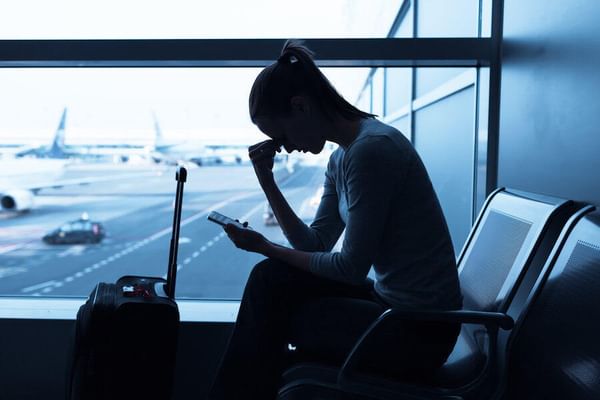- Undergraduate
Bachelor's Degrees
Bachelor of ArtsBachelor of EngineeringDual-Degree ProgramUndergraduate AdmissionsUndergraduate Experience
- Graduate
Graduate Experience
- Research
- Entrepreneurship
- Community
- About
-
Search
All Thayer News

Dartmouth Engineering Helps Airlines Better Understand and Serve Passenger Needs
Oct 06, 2022 | by Catha Mayor
You're at the airport and your flight was just cancelled. How do you feel? What are you most likely to do in that situation? What do you expect the airline to do? Dartmouth Engineering Professor Vikrant Vaze co-developed a new algorithm for accurately capturing, and effectively responding to, passenger behavior under disruptions. Predicting this behavior can lead to more cost-effective airline operations and fewer delays.
"Airlines can actually improve operations for everyone by understanding what their customers are thinking," says Vaze. "Rather than taking passengers for granted, understanding how they feel about and respond to disruptions to their plans can make the recovery process work better all around."

Vaze is co-author of "Passenger-Centric Integrated Airline Schedule and Aircraft Recovery" published in Transportation Science and winner of the best paper award at AGIFORS' 2022 Symposium in France. The paper addresses the question: Is it possible to develop flight disruption recovery plans that work better for everyone by anticipating how passengers will respond to these plans?
"We found that, in prior studies, airlines' disruption recovery plans sidestep customer behavior modeling," says Vaze. "Instead, they assume all passengers will automatically be willing to rebook with the airline regardless of their service quality or associated compensations. However, passenger rights regulations alter the way passengers perceive their options—including those from competing airlines—causing some to not show up for the rebooked flight. We find that explicitly accounting for passenger rights regulations and the behavior they elicit paves the way for better recovery plans that can save airlines over 400,000 dollars per day and reduce passenger no-shows by up to 70 percent.
"Our algorithm gets you the best possible solution incredibly fast, which is what you need in an operational setting, and accounts for a myriad of complexities—not only passenger behavior but also aircraft maintenance, flight speed changes, and airport slots."
The research shows that capturing passenger behavior matters, and it provides hands-on tools, models and algorithms that can leverage this knowledge to develop better recovery schedules. "This will not only increase awareness of the importance of understanding and accounting for passenger behavior under disruption situations," adds Vaze, "but also reduce waste from empty seats and improve the experience of all passengers."
For contacts and other media information visit our Media Resources page.
